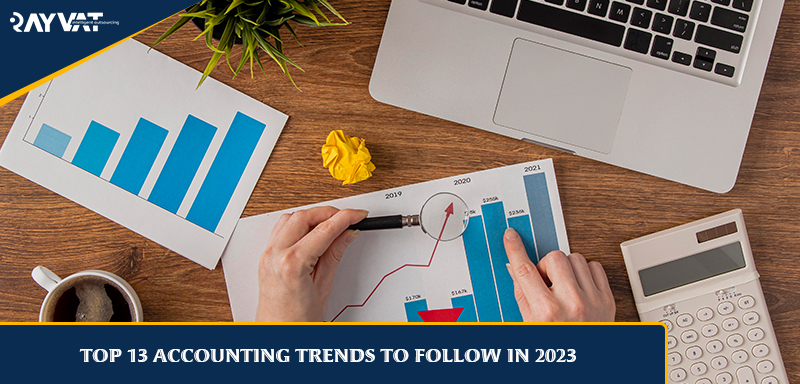In the fast-paced world of accounting, staying updated with the latest trends is crucial for professionals and businesses. As we dive into 2023, it's important to identify the top accounting trends that will shape the industry. This article highlights the Top 13 Accounting Trends to Follow in 2023 to help you navigate the ever-evolving landscape of finance and accounting.
1. Artificial Intelligence (AI) Revolutionizes Accounting
Artificial Intelligence (AI) continues to transform the accounting landscape. AI-powered software and tools automate mundane tasks like data entry and bookkeeping, allowing accountants to focus on more strategic activities. Machine learning algorithms can analyze vast amounts of financial data, enabling faster and more accurate decision-making.
2. Blockchain Technology Enhances Transparency and Security
Blockchain technology offers enhanced transparency and security to accounting processes. By recording transactions in a decentralized and immutable ledger, it minimizes the risk of fraud and manipulation. Additionally, smart contracts on the blockchain streamline auditing procedures, ensuring compliance with regulations.
3. Cloud-Based Accounting Solutions for Flexibility and Collaboration
Cloud-based accounting solutions provide flexibility and collaboration opportunities. With real-time data accessibility from anywhere, businesses can make informed decisions promptly. Cloud platforms also allow seamless collaboration between accountants, clients, and stakeholders, fostering efficiency and productivity.
4. Sustainability Accounting for Environmental Responsibility
As environmental concerns gain prominence, sustainability accounting becomes vital. Organizations are recognizing the need to measure and report their environmental impact. By implementing sustainability accounting practices, businesses can assess their carbon footprint and adopt eco-friendly strategies.
5. Remote Work and the Future of Virtual Accounting
The COVID-19 pandemic has accelerated the shift towards remote work, and virtual accounting is here to stay. Cloud-based accounting software enables accountants to work remotely while maintaining seamless communication with clients. This trend provides flexibility, and work-life balance, and opens doors for global talent acquisition.
6. Data Analytics and Predictive Insights
Data analytics empowers accountants to derive meaningful insights from large datasets. With advanced analytics tools, professionals can identify trends, patterns, and outliers to make informed financial decisions. Predictive analytics takes it a step further by forecasting future outcomes based on historical data.
7. Robotic Process Automation (RPA) Streamlines Routine Tasks
Robotic Process Automation (RPA) automates repetitive and rule-based tasks, freeing up accountants' time for more value-added activities. RPA bots can handle tasks like invoice processing, account reconciliation, and report generation, reducing errors and improving efficiency.
8. Cybersecurity Measures Safeguard Financial Data
As cyber threats evolve, robust cybersecurity measures are essential to protect financial data. With increasing data breaches and phishing attempts, accountants must stay vigilant and implement multi-layered security protocols. Encrypting sensitive information, implementing firewalls, and conducting regular security audits are crucial steps.
9. Advisory Services for Strategic Financial Guidance
Accountants are shifting from traditional roles to becoming trusted advisors. By offering strategic financial guidance, accountants can assist businesses in achieving their goals and improving profitability. Services like financial planning, risk management, and performance analysis are becoming central to accounting practices.
10. Integration of the Internet of Things (IoT) with Accounting Systems
The Internet of Things (IoT) is making its way into accounting systems. IoT devices can capture real-time financial data, such as inventory levels, machine performance, and energy consumption. Integrating IoT with accounting software streamlines data collection and enhances accuracy.
11. Regulatory Compliance and Changing Accounting Standards
Regulatory compliance and accounting standards continue to evolve. Accountants need to stay updated with changes in tax laws, financial reporting requirements, and industry-specific regulations. Compliance with regulations ensures transparency, and credibility, and avoids legal issues.
12. Data Privacy and Ethical Considerations
Data privacy and ethical considerations are gaining prominence in the accounting profession. With the General Data Protection Regulation (GDPR) and other privacy laws, accountants must handle sensitive financial information responsibly. Ethical guidelines and professional standards ensure integrity and trustworthiness.
13. Continuous Professional Development for Accountants
To adapt to the changing accounting landscape, continuous professional development (CPD) is crucial. Accountants need to upgrade their skills and knowledge regularly. By attending webinars, and seminars, and obtaining certifications, professionals can stay at the forefront of the industry.
FAQ about Accounting Trends
Q1: How can AI revolutionize accounting practices?
Artificial Intelligence (AI) can revolutionize accounting practices by automating tasks, analyzing large datasets, and enabling faster decision-making. AI-powered software streamlines processes reduces errors, and improves efficiency.
Q2: What are the benefits of cloud-based accounting solutions?
Cloud-based accounting solutions offer benefits such as real-time data accessibility, flexibility, and collaboration. Accountants can work from anywhere, access up-to-date financial information, and collaborate seamlessly with clients and stakeholders.
Q3: Why is sustainability accounting important?
Sustainability accounting helps organizations measure and report their environmental impact. By adopting sustainable practices and reducing their carbon footprint, businesses can demonstrate their commitment to environmental responsibility.
Q4: How does robotic process automation (RPA) benefit accountants?
Robotic Process Automation (RPA) benefits accountants by automating repetitive tasks, reducing errors, and improving efficiency. RPA bots can handle tasks like invoice processing and account reconciliation, freeing up accountants' time for more strategic activities.
Q5: Why is data privacy important in accounting?
Data privacy is crucial in accounting to protect sensitive financial information from unauthorized access or misuse. Compliance with privacy laws ensures trust, and credibility, and avoids legal consequences.
Q6: How can accountants keep up with changing regulations and accounting standards?
Accountants can keep up with changing regulations and accounting standards by staying updated through professional development programs, attending industry conferences, and networking with peers. Continuous learning ensures compliance and competence.
Conclusion
As the accounting industry evolves, professionals must stay abreast of the latest trends to remain competitive. The Top 13 Accounting Trends to Follow in 2023 discussed in this article highlight the transformative power of technologies like AI, blockchain, and cloud computing. Embracing sustainability accounting, remote work, and continuous learning is vital for accountants to thrive in the dynamic world of finance and accounting.
Contact us here for Accounting Services now!


